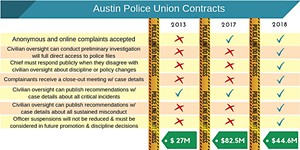Labor Update: Work and Life at APD
Contract negotiations continue with the Austin Police Association
By Nina Hernandez, Fri., June 30, 2017
Contract negotiations continued last week between the city and Austin Police Association. The oversight component, which would give the Office of the Police Monitor more latitude in a few key areas, has predictably been slow going. On Thu., June 22, representatives from the APA asked for more clarification on the items interim Police Monitor Deven Desai has laid out ("A Matter of Police Oversight," June 16).
Both parties preached patience after that June 8 meeting. At the time, Desai admitted to the Chronicle that he'd given the APA a lot to digest. "Obviously, I'm hopeful," he said. "I have no reason to doubt that we won't get to an agreement. Where they are is obviously something only they know." APA President Ken Casaday didn't disagree, saying nothing at that point was "off the table."
It's the same case in reverse when it comes to personnel issues. One such is vacation accruement. Due to the department's staffing shortage, Casaday said, many officers are running up into the cap on how many hours of vacation they can earn to sell back to the city upon retirement (up to 1,700 hours, according to the current meet-and-confer agreement), something the APA hopes to cut off. Membership believes officers should be compensated for the entirety of sick hours that they work through.
Another proposal would affect the way officers receive their payouts on unused sick leave. Up for consideration is the option for officers to have the city pay them out in different ways, rather than simply in a lump sum. Casaday framed that as a win-win for the department and the city. In one scenario, cops would be allowed to request installments, and the city could stretch out the large sums. "That's an advantage for the city because they're able to manage their money," Casaday said.
A third item on the "work/life" balance docket would give officers more flexibility to take unpaid leave in certain cases. Casaday said officers currently struggle with countless family situations that affect their ability to stay in their jobs. It would be better for the city and the officer if they could take a year off to care for a sick relative, rather than be required to completely leave the force. "This would be groundbreaking because no one in the United States does this," Casaday said, adding that the policy is "big" in Canada and Australia.
The two parties are also considering allowing detectives to occasionally work from home, if they have no interviews that day, for instance. Casaday suggested that could help further the mayor's Downtown work-from-home initiative.
The city declined to comment on ongoing negotiations, citing ground rules. A spokesperson assured us the "city and all entities will comment and respond in a joint communicative effort to these proposals at a later time and date."
Got something to say on the subject? Send a letter to the editor.










